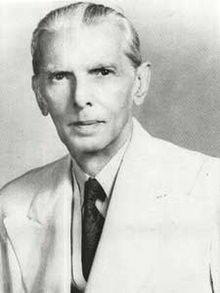Quaid-i-Azam
|
Quaid-e-Azam "Father of Nation" Muhammad Ali Jinnah |
|
|---|---|
 |
|
| 1st Governor-General of Pakistan | |
|
In office 14 August 1947 – 11 September 1948 |
|
| Monarch | George VI |
| Prime Minister | Liaquat Ali Khan |
| Preceded by | Position established |
| Succeeded by | Khawaja Nazimuddin |
| Speaker of the National Assembly | |
|
In office 11 August 1947 – 11 September 1948 |
|
| Deputy | Maulvi Tamizuddin Khan |
| Preceded by | Position established |
| Succeeded by | Maulvi Tamizuddin Khan |
| President of the Constituent Assembly of Pakistan | |
|
In office 11 August 1947 – 11 September 1948 |
|
| Deputy | Liaquat Ali Khan |
| Preceded by | Office created |
| Succeeded by | Liaquat Ali Khan |
| Personal details | |
| Born |
Mohammedali Jinnahbhai 25 December 1876 Karachi, Bombay Presidency, British India (present-day Sindh, Pakistan) |
| Died |
11 September 1948 (aged 71) Karachi, Sindh, Dominion of Pakistan (present-day Pakistan) |
| Resting place | Mazar-e-Quaid |
| Nationality | Pakistani |
| Political party |
|
| Spouse(s) |
|
| Relations | See Jinnah family |
| Children | Dina Wadia (by Rattanbai Petit) |
| Parents | Jinnahbhai Poonja (father) Mithibai Jinnah (mother) |
| Alma mater | The Honourable Society of Lincoln's Inn |
| Profession |
|
| Signature |  |
Muhammad Ali Jinnah (born Mahomedali Jinnahbhai; 25 December 1876 – 11 September 1948) was a lawyer, politician, and the founder of Pakistan. Jinnah served as leader of the All-India Muslim League from 1913 until Pakistan's independence on 14 August 1947, and then as Pakistan's first Governor-General until his death. He is revered in Pakistan as Quaid-i-Azam (Urdu: قائد اعظم; Great Leader) and Baba-i-Qaum (Urdu: بابائے قوم; Father of the Nation). His birthday is observed as a national holiday in Pakistan.
Born at Wazir Mansion in Karachi, Jinnah was trained as a barrister at Lincoln's Inn in London. Upon his return to British India, he enrolled at the Bombay High Court, and took an interest in national politics, which eventually replaced his legal practice. Jinnah rose to prominence in the Indian National Congress in the first two decades of the 20th century. In these early years of his political career, Jinnah advocated Hindu–Muslim unity, helping to shape the 1916 Lucknow Pact between the Congress and the All-India Muslim League, in which Jinnah had also become prominent. Jinnah became a key leader in the All India Home Rule League, and proposed a fourteen-point constitutional reform plan to safeguard the political rights of Muslims. In 1920, however, Jinnah resigned from the Congress when it agreed to follow a campaign of satyagraha, which he regarded as political anarchy.
...
Wikipedia
